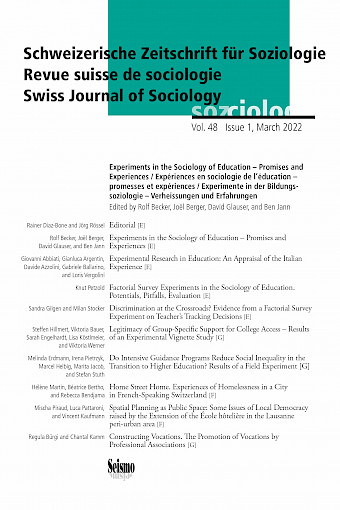Experiments in the Sociology of Education – Promises and Experiences
Rolf Becker, Joël Berger, David Glauser, Ben Jann (ed.)
Experimentelle Methoden und Forschungsdesigns, die einen Beitrag leisten zu einem besseren Verständnis der Prozesse und Mechanismen, die (Bildungs-)Ungleichheiten erzeugen oder reproduzieren, finden derzeit in einigen Bereichen der analytisch-empirischen Soziologie, wie z. B. der Bildungssoziologie, grosse Beachtung. Experimentelle Methoden und die entsprechenden Designs zielen darauf ab, kausale Effekte zu identifizieren, und sie zwingen Forschende, sich explizit mit den vermittelnden sozialen Mechanismen auseinanderzusetzen, die Ursache und Wirkung miteinander verbinden. In diesem Sinne ermöglicht die Anwendung von Experimenten im Bereich der Bildungssoziologie ein tieferes Verständnis von Bildungsungleichheiten in Bezug auf schulische Leistung und Bildungserwerb sowie von den Folgen von Massnahmen und Interventionen im Bildungssystem.
Mit diesem Schwerpunktheft möchten wir die wissenschaftliche Gemeinschaft über die bestehende experimentelle Forschung in der Bildungssoziologie und ihr Potenzial informieren, aber auch über die methodischen und theoretischen Herausforderungen, die bei der Generierung zuverlässiger Erkenntnisse über kausale Zusammenhänge in der Soziologie im Allgemeinen und in der Bildungssoziologie im Besonderen zu berücksichtigen sind. Nebst einer thematischen Einführung enthält das Schwerpunktheft fünf Beiträge, die auf verschiedene Aspekte der experimentellen Forschung in der Bildungssoziologie eingehen.
Giovanni Abbiati und Co-Autoren betonen die Notwendigkeit von Standards, die zur Bewertung der Qualität von Berichten und Protokollen über Randomized Control Trials verwendet werden könnten. Faktorielle Survey Experimente (FSE) werden von Knut Petzold im Hinblick auf Potenziale und Herausforderungen für soziologische Erklärungen und Hypothesentests diskutiert, während zwei FSE-Anwendungen die potenzielle Diskriminierung von Schülern durch ihre Lehrer bei ihren Schulempfehlungen (Gilgen und Stocker) bzw. die Legitimität gruppenspezifischer Unterstützung für den Hochschulzugang (Steffen Hillmert und Co-Autor:innen) untersuchen. Schliesslich führen Erdmann und Co-Autor:innen ein Feldexperiment durch zur Beantwortung der Frage, ob intensive Beratungsprogramme zu einer Verringerung der sozialen Ungleichheit beim Übergang in die Hochschulbildung beitragen.
Les méthodes expérimentales et les designs de recherche qui contribuent à une meilleure compréhension des processus et des mécanismes qui génèrent ou reproduisent les inégalités (scolaires) suscitent actuellement un grand intérêt dans certains domaines de la sociologie analytique-empirique, comme la sociologie de l'éducation. Les méthodes expérimentales et les designs correspondants visent à identifier les effets causaux et obligent les chercheurs à se pencher explicitement sur les mécanismes sociaux médiateurs qui relient la cause et l'effet. En ce sens, l'utilisation de l'expérimentation dans le domaine de la sociologie de l'éducation permet d'approfondir la compréhension des inégalités scolaires en termes de performance scolaire et de niveau de formation, ainsi que des conséquences des mesures et des interventions dans le système éducatif.
Avec ce numéro spécial, nous souhaitons informer la communauté scientifique sur la recherche expérimentale existante en sociologie de l'éducation et sur son potentiel, mais aussi sur les défis méthodologiques et théoriques à prendre en compte pour générer des connaissances fiables sur les relations causales en sociologie et en sociologie de l'éducation en particulier. Outre une introduction thématique, le numéro spécial contient cinq contributions qui abordent différents aspects de la recherche expérimentale en sociologie de l'éducation.
Giovanni Abbiati et ses co-auteurs soulignent la nécessité de normes qui pourraient être utilisées pour évaluer la qualité des rapports et des protocoles sur les essais contrôlés randomisés. Knut Petzold discute des potentiels et défis des expériences d'enquête factorielle (FSE) pour l'explication sociologique et les tests d'hypothèses, tandis que deux applications de FSE étudient la discrimination potentielle des élèves par leurs enseignants dans leurs recommandations scolaires (Gilgen et Stocker) et la légitimité du soutien spécifique à un groupe pour l'accès à l'enseignement supérieur (Steffen Hillmert et co-auteurs). Enfin, Erdmann et ses co-auteurs mènent une expérience de terrain pour savoir si les programmes d'orientation intensifs contribuent à réduire les inégalités sociales lors de la transition vers l'enseignement supérieur.
Experimental methods and research designs that help understand the processes and mechanisms generating or reproducing (educational) inequalities are currently attracting a great deal of attention in some areas of analytical-empirical sociology, such as the sociology of education. Experimental methods and the related designs aim to identify causal effects and they force researchers to be explicit about mediating social mechanisms that link cause and effect. In this sense, the application of experiments in the field of sociology of education allows for a deeper understanding of educational inequalities related to achievement and attainment, as well as of the consequences of policies and interventions in the education system.
With this focus issue, we would like to inform the scientific community about existing experimental research in the sociology of education and its potential, but also about methodological and theoretical challenges that need to be considered in generating reliable knowledge about causal relationships in sociology in general, and in the sociology of education in particular. In addition to a thematic introduction, the focus issue contains five contributions covering various aspects of experimental research in the sociology of education.
Giovanni Abbiati and co-authors highlight the necessity for standards that could be used to evaluate the quality of reports and protocols on randomized controlled trials. Factorial survey experiments (FSE) are discussed by Knut Petzold in regard to potentials and challenges for sociological explanation and tests of hypotheses, while two FSE applications investigate potential discrimination of pupils by their teachers in their school recommendations (Gilgen and Stocker) and the legitimacy of group-specific support for college access (Steffen Hillmert and co-authors). Finally, Erdmann and co-authors conduct a field experiment to answer whether intensive guidance programmes might contribute to reduced social inequality in the transition to higher education.

